Green energy technologies require sustained availability of many non-abundant materials and building of new infrastructure systems where the very high energy density produced by
nuclear fusion reactors will be essential for achieving future sustainable energy supply.
The Russian Federation-Ukrainian 2022 conflict has convinced the European leaders to pursue a strategy for eliminating the European dependence on Russian coal, oil, and gas, but these leaders have not yet significantly sanctioned the imports of these resources from Russia. They have, however, sanctioned just about everything and everyone dealing with Russians, because the Russians are viewed as aggressors which do not merit to belong to the world's "civilized community". What is more likely, however, is that the external actors have hidden agendas, such as the monopolistic dominance. In the past, poor leaderships of nations have contributed to the falls of democracies and empires, and in particular the fall of the Athenian democracy. Let us briefly examine what are the potential energy sustainability consequences for Europeans if they terminate trading with their largest eastern neighbor.
The European Union currently consumes about 400 billion m3/yr of gas of which 150 billion m3/yr is supplied by Russia. This 40% of Russian gas keeps many European factories running and households warm during the winter, and it does not appear that Russia will cut off its gas export because it greatly benefits from a significant monthly profit of about $10 billion.
The transitioning away from the Russian natural gas supply to more expensive Liquified Natural Gas (LNG) supplied primarily by United States and Norway is not possible because the present western LNG infrastructure is not equipped to substitute the Russian gas. On April 11, 2022 the OPEC secretary general Mogammed Barkindo declared that it will also be impossible to replace the Russian oil because of sanctions. The same secretary warned the European Union to promote a "realistic" approach to energy transition. Germany is particularly dependent of Russian energy from gas, oil, and coal and risks major industrial disruptions, while several European countries declared that it would be "impossible" for them to terminate buying Russian energy sources.
Transition to green energy sources presents materials sustainability obstacles that requires involving Asian nations for building large infrastructure systems, overcoming the EU bureaucracy, and coping with higher energy costs, to name a few. By loosing the European energy supply contracts, the Russian Federation will also loose because presently it does not have a large energy supply infrastructure to divert its energy supply to the Asian markets. Russian LNG plants use technology whose spare parts are sanctioned by the West and therefore risk of becoming nonoperational with time. Russia and Ukraine together produce one third of world's wheat and fertilizer requirements, which translates into higher food prices and shortages if the war is propagated for a long time.
The extraordinary sanctions on Russia risk of being counterproductive. For Russia, with its 145 million people and enormous natural resources, this will induce the country to establish barriers to protect its resources and investments and organize with new trading partners in Asia, Middle East, Africa, and South America. Just during the first quarter of 2022 the reciprocal trades between China and Russia increased by 30% and with time will certainly rise.
For Europe, with its limited fossil fuel and agricultural resources, its 750 million people will be subjected to higher energy and environmental costs (importing energy from US, coming on line of nuclear fission reactors and coal power plants), increasing dependence on nations with poor energy security guarantees, and basically becoming more dependent on the United States. Marginalizing Russia for being a bad actor on the world stage thus increases the risk of reducing the European energy sustainability, increases global warming, reduces the possibility of a greater European independence, and increases the chance of being used as proxy for confrontations of large powers.
The Press United reported on 11 April 2022 that the Bavarian politician Markus Söder warned that the Germany's immediate embargo on Russian gas would lead to "mass unemployment, social decline and democratic upheaval". Germany currently imports about 60% of the energy it uses and depends on Russia for about one-third of total energy consumption. One thing is certain, however, the era of inexpensive and abundant clean energy import to Europe appears to be ending and sanctioning a large energy supplying neighbor is effectively declaring an economic world war that could escalate to unthinkable consequences. Russia, however, will remain economically viable as long as it is able to trade with tangible commodities instead with services where the sanctions have much larger impact. The dollar as the world's currency greatly risks of being replaced and the reserves of countries kept in foreign countries diminished. The new energy supply alliances will in the future become the principal headache for the disruptors of 2022 energy sustainability.
Prospects
Achieving the energy supply sustainability for all peoples on the Earth and minimizing global warming requires effective integrations of technical and social issues. Population and standard of living are increasing almost everywhere on Earth, and without the availability of inexpensive and abundant sustainable energy we greatly risk of loosing our hard-earned progress. Human ingenuity is our best indicator that we will be able to overcome our internal differences and reorganize for the best. But we should not underestimate the damage that is being produced from the arrogance and greed that lead to cold wars, hot wars, economic wars, information wars, etc. Emotions have short life spans and cannot be used to propagate good governance.
12 April 2022
Return for further updates on the Disruption of Energy Sustainability
25 April 2022: The Disruption of Energy Sustainability will significantly increase world military cxpenditure.
1 May 2022: Bulgaria and Poland refused to pay for Russian gas and Russia terminated gas supply to these countries. Russian gas export to Europe dropped 30% and to China increased 60%. European energy cost increased 20% and the euro exchange rate dropped to $1.05.
16 October 2022: North Stream 1 and 2 gas pipelines, used to carry Russian natural gas to Europe, shut down deliveries last month and only the gas pipeline through Turky remains operational. Because of EU and US sanctions on Russia its 40% gas supply to Europe has been dramatically reduced this year, and Russian coal, oil, and gas exports to Asian markets have signicanly increased.
Sanctions have also caused a shifting away from the dollar as the principal exchange currency.
18 December 2022: European Union and US alliances are almost daily imposing additional sanctions on Russia and China. These sanctions are significantly increasing the energy cost in Europe, as reported by Bloomberg on 18 December 2022:
Europe's $1 Trillion Energy Bill Only Marks Start of the Crisis
The sanctions are also increasing Russian fossil fuels exports to China, India, and other nations that are not parties to the sanctions. China's gas import from Russia doubled through the Power of Siberia pipeline and the Russian oil and other products are being exported through other methods that bypass the sanctions. See also IEA data and statistics.
When all the "bad actors" have been sanctioned without achieving the wishing goals, what then? Will the
doomsday clock ring midnight and the patricians continue sanctioning from their bunkers the few remaining plebeians? We have a tremendous capacity to bypass the obstacles, but too often find ourselves in great difficulties because we failed to learn the basics.
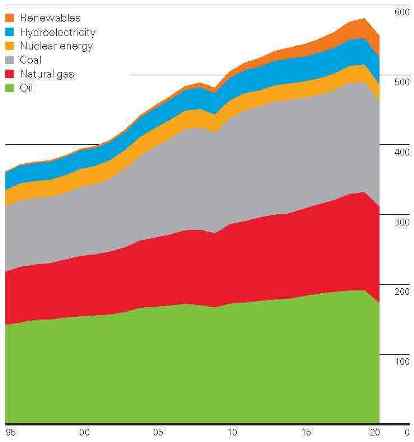
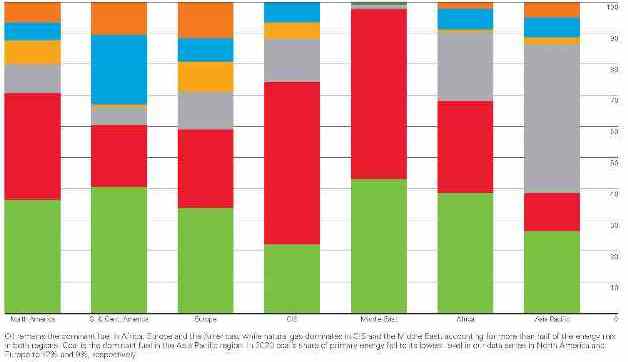 Left image: World energy needs in exajoules. Right image: Regional consumption pattern percentage (from left to right: North America, South Central America, Europe, CIS, Middle East, Africa, Asia Pacific). Source: Statistical Review of World Energy 2021.
Left image: World energy needs in exajoules. Right image: Regional consumption pattern percentage (from left to right: North America, South Central America, Europe, CIS, Middle East, Africa, Asia Pacific). Source: Statistical Review of World Energy 2021.
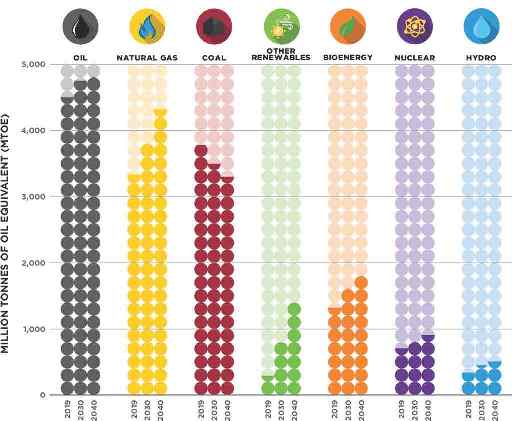 World Energy Mix
World Energy Mix
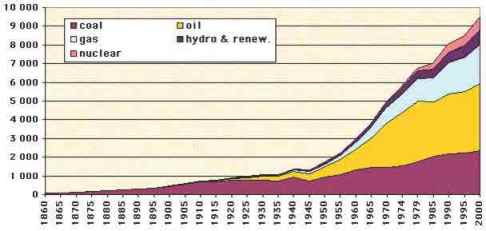
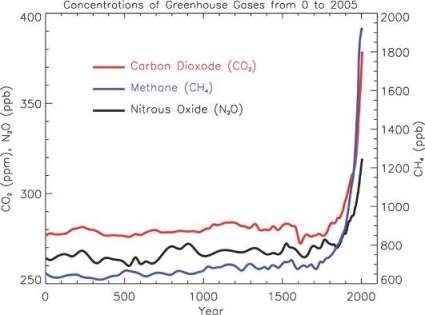 Primary energy (coal, oil, gas) consumption of humans has been increasing dramatically since the Industrial Revolution which started in the 18th century. The nuclear energy production from fission nuclear reactors started in the 20th century. The oil and gas consumptions now exceed the coal consumption, with gas producing the least amounts of emissions of greenhouse gases. Combustion of fossil fuels emits over 50 gigatons of carbon dioxide per year.
Primary energy (coal, oil, gas) consumption of humans has been increasing dramatically since the Industrial Revolution which started in the 18th century. The nuclear energy production from fission nuclear reactors started in the 20th century. The oil and gas consumptions now exceed the coal consumption, with gas producing the least amounts of emissions of greenhouse gases. Combustion of fossil fuels emits over 50 gigatons of carbon dioxide per year.
Assuming no large-scale human conflicts, there will be close to
9 billion people on Earth by the end of this century and more and more people will be dependent on each other. Large civilizations have been built by exploiting large quantities of easily acquired raw materials and cheap labor forces, but in the future it will be harder and harder to acquire such inexpensive resources unless serious collaborative efforts are sustainably maintained between different cultures.
Hot, cold, economic, and information wars are not beneficial to the growth of humanity, because they only promote the arrogance of bad leaders and tribal superiorities. The 2022 war in Ukraine clearly demonstrates how these features are reducing the world's security. 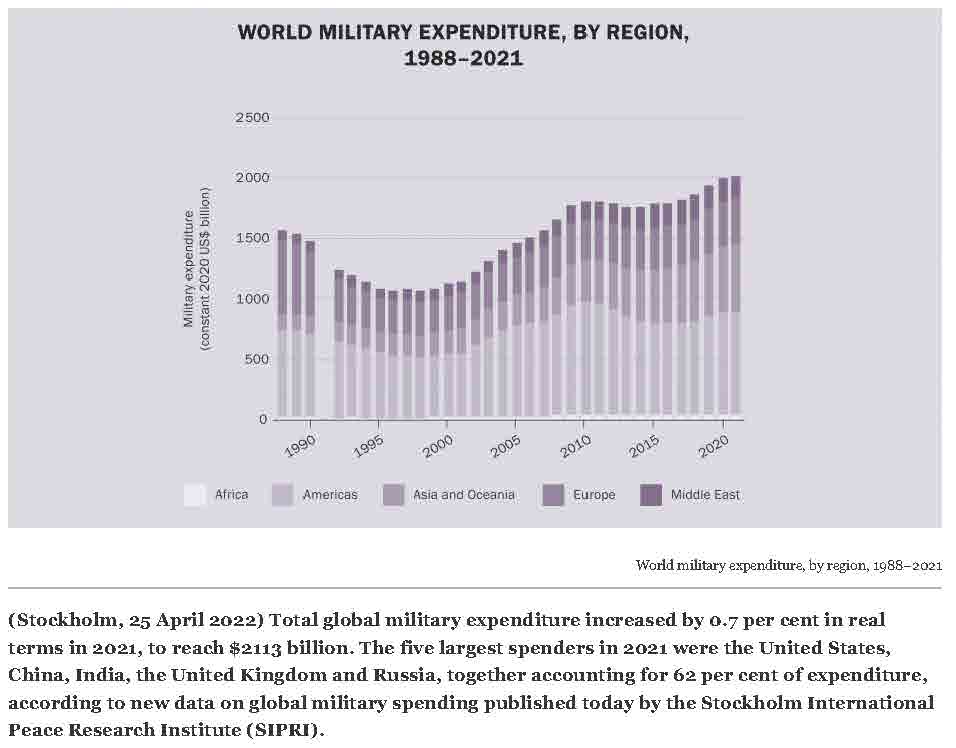
Resilient and Sustainable Future